
by ThinkSayBe | Jun 12, 2014 | 2014, Africa, Awareness, Being Thankful, Communication, Discipline, Education, Expat Life, Eye on Culture, Family, Girls, Humor, Older Children, Parenting, Technology, Teenagers, ThinkSayBe, USA, World Motherhood
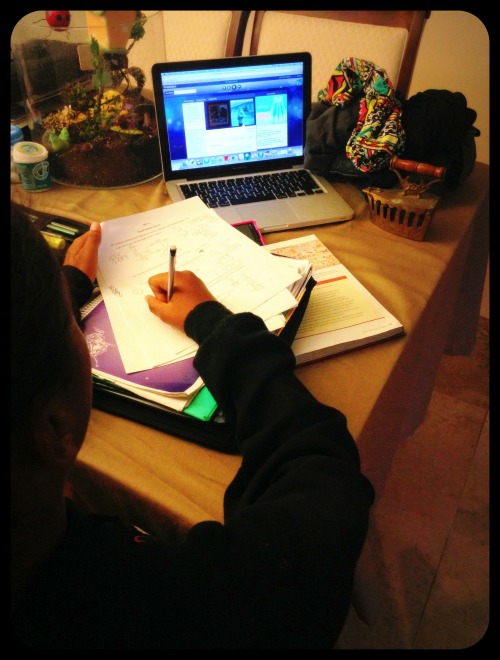
“But mom, why can’t I do my homework in front of the TV??? I’m not watching it, I’m just listening to it!!”, says my 12-year-old girl, emphasizing the word ‘watching’ with a half roll of the eyes.
My daughter is a really cool human & a great child. She is a tween so craziness and challenges come with the territory. Still, she has sweet moments, and she “OKs” everything, whether she remembers later or not.
But, my life was very different growing up in Italy and then Tanzania…
By age 9 my older brother & I alternated daily chores. We had to do dishes & sweep daily. There was no dillydallying, no talk-back, no having to dry our hands to like a song on Pandora…. none of that. We did homework on the kitchen table, our beds, in the yard, and wherever else. After I was done with homework I’d have to use the house phone, speak to a parent with good phone manners, & find out if my friends could come play. There was no texting them.
Everyone knew our plans; at least initially (smile). Outside we used our imagination to play with nothing. We picnicked under a tree in this huge sunflower field. We rode our bikes in circles in the bus’ parking lot and made sure we were home when the lights came on.
When I was 11 we moved back to Tanzania. Life here was drastically different, yet, in some respects there was more access to things than we had in the small Italian town we lived in. However, constant electricity and running water were gone. We had a western toilet in our home, but often had to use toilets requiring squatting, be they a hole over a sceptic tank, or an Eastern latrine. Not having water & electricity all the time required planning.
Though there was hired help, we also had to fetch water. If you don’t like fetching water you learn to use it sparingly. You take a shower from a bucket that’s a quarter full and come out clean! You recycle water so that first you wash your hair by dipping it into the bucket, then use the same water as the first cycle of your laundry, which you wash by hand. Having city-wide rationed electricity, meant ensuring you have kerosene, wick for lamps, and match sticks. You actually needed plenty of match sticks in Tanzania, because there is this one brand that makes them and you’re lucky if one out of five matches actually lights up & stays lit. HAHA!
We must see these things as humorous. Lack of electricity and paying for it in advance, meant using it responsibly. The radio would be on, and so would the TV for some parts of the day. We knew to close the fridge fast and to unplug the iron as soon as the job was done. Ironing was not always done with an electrical iron, either. Some times we would use a charcoal iron. It sounds like it’s from an entire different era, right? It’s still being used. A charcoal cast iron had to be used carefully. You’d also plan how to get hot coals so instead of wasting charcoal, kerosene fuel, and good match sticks, you’d use the charcoal for cooking. That required planning as well. A lot of planning and patience for a youngster, and children had to consider all these things from toddlerhood!
I am so infinitely grateful we lived this kind of life in my teenage years. Though I am sure I threw crazy hormonal arrows (figuratively speaking) at my mom, I think that having to deal with these realities made me get myself together quickly, thus sparing her six years of teenage craze. As far as school goes…wow! We had mandatory knee-high socks & buffed black shoes, mandatory hair pleats that I never had, monitors & prefects who thrived on their power to make us kneel for ‘misbehavior’, and hit-happy, switch-carrying teachers in the hallways who would whack you for no good reason.
In elementary school we had to chant….slowly & loudly…..”GOOD MORNING TEACHER!” Then we’d answer & ask, “FINE THANK YOU TEACHER, AND HOW ARE YOU, TEACHER?”, then we’d be permitted to sit down. In boarding school we had exactly 30 minutes to eat. The first year we ate food we individually cooked the night before, hoping it was still good without refrigeration. As a senior, food was made for us, so we’d hope it was ready & that we didn’t have to scoop bugs out of our beans. We’d always wash our dishes before returning to class. All of this, in 30 minutes.
At this school there was no corporal punishment. However, if we were late or didn’t follow other rules, we’d have some agricultural work for at least one period.
We studied in the hall after we cleaned our dinner mess. After two hours of supervised solid studying, we’d return to our hostel rooms (mine had four bunk beds with three beds each), and lights were out by 10pm. Everyone took showers in the morning, which I found to be unnecessary as the water was very cold, so I would leave some water in the courtyard for the sun to heat , and take a shower after school.
When I came to the United States I didn’t think I had a different work ethic than anyone else. I thought we all work hard & have different struggles. As the years passed I began to see certain differences & felt extremely fortunate for my history as it was.
As a girl I was lucky that my mother (who is partially Afghani & Punjabi) didn’t believe that I was worthless, blessed that she believed in education and sent me to school. I was also fortunate that I wasn’t betrothed at a young age, or at all. As I was in college I understood that I was privileged and had to make other women proud.
I would have to get the best grades, be a well-rounded student & not take electricity and running water for granted. So when my daughter asks why she can’t do her homework in front of TV, I don’t know what to say! OK, I do answer her, trying to use logic she’ll understand. She visited Tanzania for a few months in 2010, but she cannot relate to my history.
When my daughter was round age four she always asked if she could help with chores, but as I tried to rush I’d ask her to draw or play instead. I thought the environment around us would do for her what it did for me at her age. I knew I wasn’t in Italy, or in Tanzania, but I still thought I wouldn’t be the only one pushing for a balanced human. I also didn’t anticipate technology advancing so incredibly fast & how much gadgetry she would have at her disposal. In retrospect I should have encouraged her willingness to help.
She is now 12, doesn’t like to do any chores other than the occasional Swiffer mopping. She wants to do homework while listening to TV, somehow ignoring the visuals, and she wants to spend her other homework time listening to pop songs. She does practice Brazilian Jiu Jitsu and has a unique passion for it. But when not doing her school work, she looks at photos with funny quotes, watches short videos, and messages her friends on her phone. Our lives are so different. How do I teach her what I’ve been taught?
Is it drive? Is it thirst? Can you relate? How do you teach your children how to work hard? Please share your findings with me!
This is an original post to World Moms Blog by Sophia in Florida, USA. You can find her blogging at Think Say Be and on twitter @ThinkSayBeSNJ.
Photo credit to Trocaire. This photo has a creative commons attribution license.
I am a mom amongst some other titles life has fortunately given me. I love photography & the reward of someone being really happy about a photo I took of her/him. I work, I study, I try to pay attention to life. I like writing. I don't understand many things...especially why humans treat each other & other living & inanimate things so vilely sometimes. I like to be an idealist, but when most fails, I do my best to not be a pessimist: Life itself is entirely too beautiful, amazing & inspiring to forget that it is!
More Posts
Follow Me:

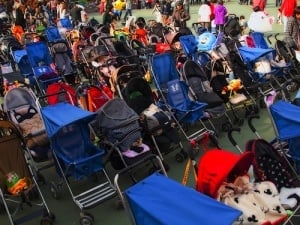
by Maman Aya (USA) | Jun 6, 2014 | 2014, Parenting, World Motherhood
I cried tonight. Real tears rolled down my face and my heart ached. My husband came and wrapped his arms around me and asked “Is it the suddenness of it?” You see, my dear friend is about to have a baby boy. Her first. I am so excited for her and so happy for her, she has wanted this for so long.
When she told me that she was pregnant, I immediately told her that I would give her my Bugaboo stroller – you know, the one that starts as a bassinet and converts to a big kid stroller as the child grows, has shocks on the tires (which you certainly need in the rough NYC streets) and accessories up the wazoo. I had my stroller for 7 1/2 years, and used it with both of my children. It was my son’s first “bed”, since I didn’t see the utility in buying a separate bassinet that he would only use for a few months. I had all of the accessories for it, from the cute little umbrella to the board that my son rode on once my daughter was born and it had been reconverted to a bassinet.
Last month my husband cleaned all of the hardware, vacuumed any loose crumb and reassembled the bassinet to prepare for this new baby boy to enjoy his turn to ride in his luxurious ride. He lovingly washed away our lives and children from it. I bought a new color canopy for it (I had red. My friend wanted blue).
I am happy that the stroller will bring such happiness to another family, especially a family that is so close with mine. I am happy that it will not collect dust, in a corner, now that my 3 1/2-year-old has almost outgrown it. I am happy that we are definitely getting our money’s worth, by passing it on to another child to use and grow into.
So why did I cry? Why am I still choked up as I write this? It’s because all of a sudden I realized that the removal of the stroller makes it so final.
Even though I said when my daughter was born, that I was done having children, somewhere in the back of my heart, I guess I still held out hope that we may decide to have another. My children have now started to ask for another baby, and I explained that we would not be having any more, but I am realizing that I haven’t fully accepted it.
I know that I currently feel overwhelmed with my work and family obligations. I can barely take care of myself and my family and home the way it is – how could I add another baby to the mix? I have finally gotten back to exercising and taking care of me – do I have the strength go through another pregnancy again especially as I am so close to turning 40 (shhh – don’t tell…. I will forever be 29 in my heart :))? I don’t think so. At least not right now.
I made the decision not to have anymore children, but taking our first stroller out of my home-made it so final, and I guess with this act I realized that maybe… just maybe… there is another soul out there who is destined to join our little family of four. Or, maybe not. But at least for now, if the time comes, that little soul will have a different stroller.
Have you ever doubted your choice in continuing/stopping to grow your family? What was your defining/questioning moment?
This is an original post to World Moms Blog by Maman Aya of New York City in the USA.
Photo credit to Carol at If By Yes.

Maman Aya is a full-time working mother of 2 beautiful children, a son who is 6 and a daughter who is two. She is raising her children in the high-pressure city of New York within a bilingual and multi-religious home.
Aya was born in Canada to a French mother who then swiftly whisked her away to NYC, where she grew up and spent most of her life. She was raised following Jewish traditions and married an Irish Catholic American who doesn’t speak any other language (which did not go over too well with her mother), but who is learning French through his children. Aya enjoys her job but feels “mommy guilt” while at work. She is lucky to have the flexibility to work from home on Thursdays and recently decided to change her schedule to have “mommy Fridays”, but still feels torn about her time away from her babies. Maman Aya is not a writer by any stretch of the imagination, but has been drawn in by the mothers who write for World Moms Blog. She looks forward to joining the team and trying her hand at writing!
More Posts

by Susie Newday (Israel) | Jun 4, 2014 | 2014, Inspirational, Israel, Parenting, World Motherhood

Without exception, every living and breathing person needs love. (Duh….)
Obviously, we each have our own unique ways of expressing love and of feeling loved, but I find it amazing that babies, children and adults all have the same universal yearning and desire to feel loved. (In case anyone is interested in figuring out how they express and receive love, this is a great resource.)
The poem below is very personal and from the heart. I’m sharing it because only after I wrote it did I realize that the way I wrote my prayer/request for love, it’s really applicable for everybody not just me. Babies don’t know how to put into words what they need, but they need to be loved in all those ways. The same goes for kids, teens, adults and old people.
I’m sharing this in the hope that next time one of us has no patience for someone else, or someone is upset with someone else that we can maybe just take a moment and remember that in each of our actions is a plea for love.
Do you know how to recognize a request for love? Do you know how to ask for love?
Love Me
Love me tender
don’t hurt my soul
Love me gently
Don’t let me go
Love me unconditionally
make me feel safe
Love me intensely
help me believe in me
Love me compassionately
put your hand in mine
Love me fully
give me your attention & time
Love me sincerely
without a hesitation and doubt
Love me kindly
make me feel cherished & loved
Please be love*
so that I may learn from you
Love me like no other
and may our paths never part
*Be love as opposed to “to love”. When we are beings of love, we treat everyone including ourselves better.
This is an original post to World Moms Blog by our contributor, Susie Newday in Israel. You can find her on her blog New Day New Lesson.
Photo credits to the author.
Susie Newday is a happily-married American-born Israeli mother of five. She is an oncology nurse, blogger and avid amateur photographer.
Most importantly, Susie is a happily married mother of five amazing kids from age 8-24 and soon to be a mother in law. (Which also makes her a chef, maid, tutor, chauffeur, launderer...) Susie's blog, New Day, New Lesson, is her attempt to help others and herself view the lessons life hands all of us in a positive light. She will also be the first to admit that blogging is great free therapy as well. Susie's hope for the world? Increasing kindness, tolerance and love.
You can also follow her Facebook page New Day, New Lesson where she posts her unique photos with quotes as well as gift ideas.
More Posts - Website
Follow Me:





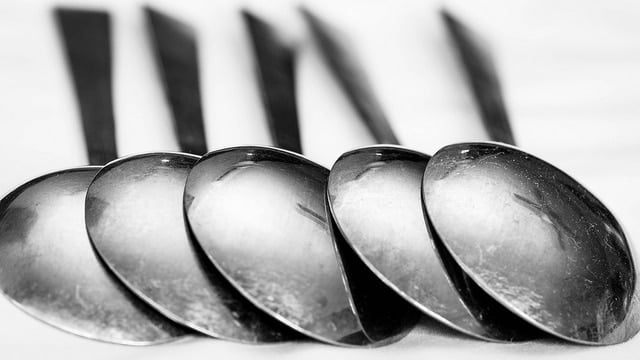
by Olga Mecking | Jun 2, 2014 | 2014, Awareness, Being Thankful, Child Care, Health, Kids, Life Balance, Maternal Health, Me-Time, Motherhood, Netherlands, Parenting, World Motherhood, Younger Children
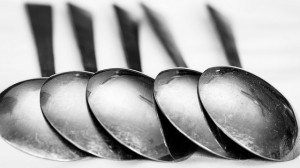 Recently, I’ve been reading about the Spoon Theory (also sometimes called the token theory). The idea is that we’re all given a certain amount of spoons (or tokens) each day—metaphorically of course–to spend on all the things that we need to get done during the day.
Recently, I’ve been reading about the Spoon Theory (also sometimes called the token theory). The idea is that we’re all given a certain amount of spoons (or tokens) each day—metaphorically of course–to spend on all the things that we need to get done during the day.
It is usually applied to explain disabilities or chronic illnesses, which often can’t be seen but still make people’s lives difficult (like Lupus, Chronic Pain or Aspbergers). But I actually think that, without dismissing the experiences of these people, the spoon theory also can be expanded to include moms.
Just think of all the things you have to do during the day, and then imagine doing them without children. You wouldn’t even have to think when you got dressed in the morning. Eating breakfast would be simple and effortless. You’d be able to get out of the house in a matter of minutes and you might even be able to get places on time.
When you’re a mom, suddenly everything takes more time. You don’t only have to make breakfast for yourself, you make it for one, two, three, or more people. Here go three spoons- and I don’t mean the ones you use to eat breakfast.
You want to get out of the house. You put your coat on, your children’s coats on. Your price in spoons depends on the amount of children you have and the season- less children cost less spoons, winter is more expensive than summer.
Whatever you do, whether you are a working mom or a SAHM, you likely will be out of spoons by the end of the day. Some days are better and you may even have a few spoons left. Some days are horrible and you run out of spoons before noon. The unexpected temper tantrum costs a spoon or three. Taking your child to the hospital because he’s sick is another five spoons.
Remember, you only get a certain amount of spoons per day and that amount is limited. You can borrow the spoons from the next day but that could be the very day your child gets sick or when she decides that from now on, she will absolutely refuse to do whatever you ask her to do.
But not all moms are given equal amounts of spoons. Some have less than others. These are the moms who have disabled children. These are single moms with two jobs and no support. These are the moms all over the world living in poverty. They struggle every day to provide the best for their children. Yes, parenting under such circumstances is definitely more spoon-costly.
But it isn’t easy even for a family without such challenges. So what can we do? Spend our spoons wisely. Prioritize.
For example, in my case, perfectly folded laundry isn’t worth a spoon but a nicely prepared dinner most definitely is. We can try to replenish our spoons by getting some me-time. We can remember to sleep. We can get help- whether it’s from family, friends or childcare.
These are the things we can do for ourselves. But there are also things we can do for others. When thinking about how to spend your spoons or tokens, please set aside a certain amount for your fellow moms. You can do it by offering support. Offer a shoulder to cry on, extend your helping hand, say encouraging words.
It may seem like spending your own precious spoons but it is really a kind of investment. Because any price is easier to pay if everyone pitches in.
But, all economic and metaphorical imagery aside, I just want to point out the obvious: motherhood is hard. Let’s be kind to ourselves. And let’s help each other out.
Of course, we don’t really need such theories to explain how hard it it so be a mom. But I thought the spoon theory is a rather good way to illustrate the challenges of motherhood.
What are you thoughts on this? Is it helpful to think of your day in terms of having a limited number of spoons (or tokens) to spend?
This is an original post to World Moms Blog from our Polish writer in the Netherlands, Olga Mecking.
The image used in this post is credited to Nicki Mannix. It holds a Flickr Creative Commons attribution license.
Olga is a Polish woman living in the Netherlands with her German husband. She is a multilingual expat mom to three trilingual children (even though, theoretically, only one is trilingual since she's old enough to speak). She loves being an expat, exploring new cultures, learning languages, cooking and raising her children. Occasionally, Olga gives trainings in intercultural communication and works as a translator. Otherwise, you can find her sharing her experiences on her blog, The European Mama. Also take a while to visit her Facebook page .
More Posts - Website
Follow Me:




by Sarah Hughes | May 30, 2014 | 2014, Family, Kids, Maternal Health, Motherhood, Parenting, Sarah Hughes, USA, Working Mother, World Interviews, World Motherhood, Younger Children
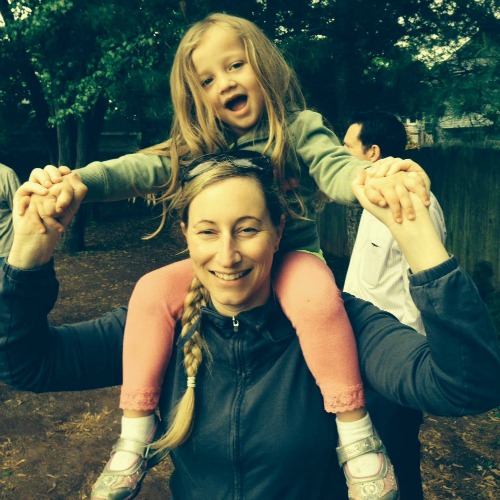
Sarah Hughes has been helping out behind the scenes at World Moms Blog. Read her interview to learn more about our newest contributor in North America! (more…)
Sarah grew up in New York and now calls New Jersey home. A mother of two, Derek (5) and Hayley (2), Sarah spends her days working at a University and nights playing with her children. In her “free” time Sarah is a Shot@Life Champion and a volunteer walk coordinator for the Preeclampsia Foundation. Sarah enjoys reading, knitting, sewing, shopping and coffee. Visit Sarah at her own blog Finnegan and The Hughes, where she writes about parenting, kid friendly adventures and Social Good issues. Sarah is also an editor, here, at World Moms Blog!
More Posts - Website
Follow Me:




by Nancy Sumari | May 28, 2014 | 2014, Africa, Awareness, Home, Humanitarian, Nancy Sumari, Social Equality, World Moms Blog, World Motherhood, World Voice
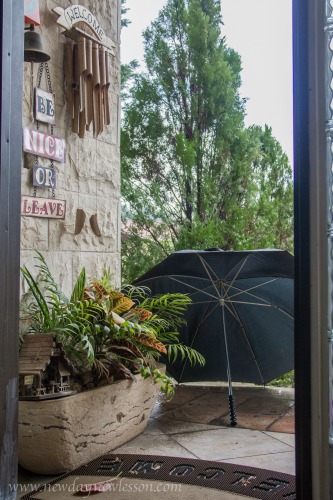
I was recently asked to be a part of the upcoming UNHCR World Refugee Day in my country. I was asked to put literally myself in the shoes of those individuals who have been forced out of their homes and countries, due primarily to conflicts. I was then invited to contribute my thoughts and feelings through a document that would be shared at a gathering on World Refugee Day.
As a mother, I feel that our primal instinct is to protect and nurture, but protection and nurturing that is coupled with nesting. To many of us, a nest may initially bring a picture of “a little bird and a couple of eggs” to mind but in my opinion, a nest brings to mind home. It means having a center, a base, headquarters, in short somewhere to come back to.
That got me thinking. What does this four-letter word, HOME, really mean? To some, not much, because for them it’s something easily taken for granted. To others, it’s a base. A place where you shower, change, nap and get back out there. But, for a lot of people, it’s a residence, it’s family, it’s dignity, it’s freedom. Most importantly, it’s where the heart is. I probably can’t even count the amount of times that I’ve walked in and out of my home, the amount of time I’ve spent time in my home just hiding away from the world in a safe and comforting haven. A lot of those times, I have not really sat and looked around to soak it in and really see what it all means, and certainly not for me, but for my family, until now.
The thought of the loss of this base, this center, a center that helps us be centered, truly breaks my heart. So here I am, thinking about the 5 million people in Tanzania who are currently refugees without ‘A Home’. My heart breaks to think about what that means for the 48% of refugees who are children. I am empathizing with them but also in awe of them all. In awe of their strength. In awe of their resilience.
I wish for a day when every person in this world will have a physical home to house the home each of us carries with us in our hearts.
What does home mean for you?
This is an original post by Nancy Sumari from Tanzania. You can find more of her writing at Mama Zuri.
Photo Credit to Susie Newday.





















